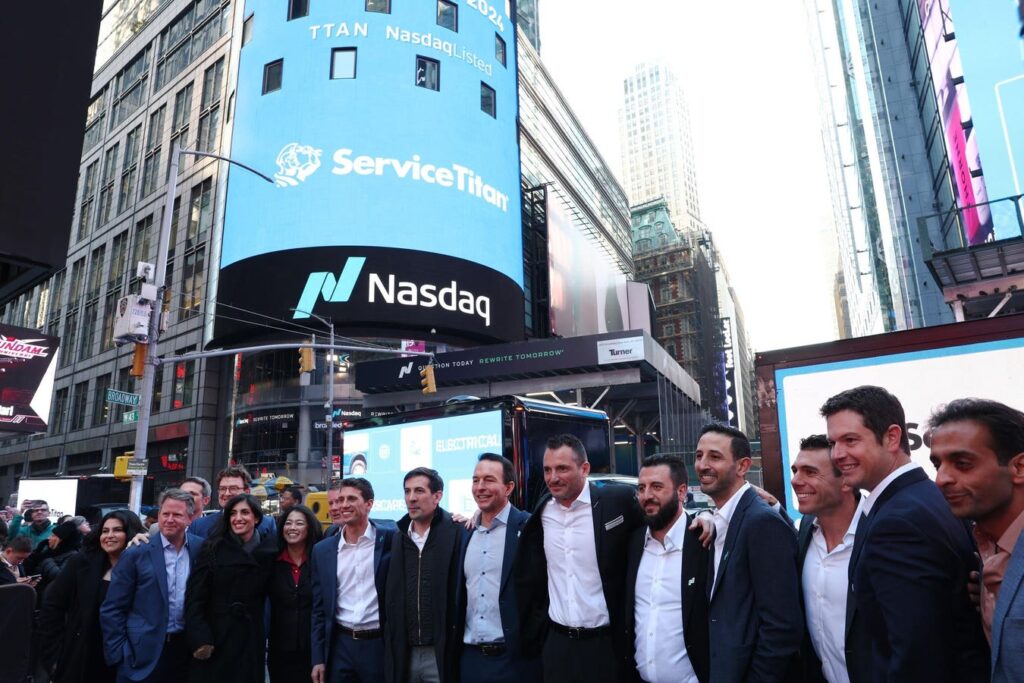In the weeks since ServiceTitan filed to go public in November, CEO Ara Mahdessian had to hold his tongue while speculation ran rampant about his company’s ulterior motives to take the plunge. 2024 was a snoozer year for tech IPOs, and many companies were content to sit on the sidelines awaiting better market conditions for their Wall Street debuts. Enterprise software company ServiceTitan was only making an exception because it had to, industry insiders said — noting a provision in a previous private financing that meant that if it waited longer, investors would receive more shares.
Bound by a “quiet period,” ServiceTitan couldn’t respond. But as his company opened trading on Thursday and closed 42% above an already-higher than anticipated list price of $71, valuing the business at $8.9 billion at end of day, CEO Ara Mahdessian scoffed at the notion he’d gone public on someone else’s clock.
“We don’t make a decision this important based on financing terms,” he told Forbes in a call from Nasdaq’s midtown bell-ringing site. “You can see the strength of the business yourself and the favorable conditions in the market yourself.”
Thursday’s IPO was a long time coming. Founded in 2012 by Mahdessian and President Vahe Kuzoyan, two Armenian immigrants in Glendale, CA, the company’s original focus was to target tradespeople for home repairs, like local plumbers or air conditioning technicians. ServiceTitan provides them with software tools to help maintain their businesses, including services for dispatching and routing, procuring parts, marketing and automated financial reports. “We serve this super important industry that does not get its fair share from the overall zeitgeist,” Kuzoyan told Forbes.
ServiceTitan, which ranked No. 6 on Forbes’ 2024 Cloud 100 list of the world’s top private companies, saw a bump in business during the pandemic, when people were locked down in their homes, suddenly in need of more maintenance and repairs. The uptick led to a $500 million Series F round in 2021, with a valuation of $8.3 billion. Before the IPO, the company had raised a total of $1.4 billion from investors including Iconiq Growth, Bessemer Venture Partners, TPG and Index.
ServiceTitan was saddled with terms around its IPO during its Series H round in 2022, which contained terms for an IPO “ratchet” — essentially putting ServiceTitan on a deadline to go public by May 2024 or face unwanted dilution of its shares. The longer it waited to go public — and the lower its IPO share price fell in comparison to its Series H price of $84.57 — the more shares would go to Series H investors, not to existing shareholders, according to an analysis by Meritech Capital. But by the end of IPO day, it was all water under the bridge: The company’s new $8.9 billion market cap easily cleared its last private valuation of $8.3 billion.
ServiceTitan’s annual revenue in the 2024 fiscal year was $685 million, with a net loss of $183 million, according to the company’s S-1 filing. Year-over-year revenue, however, grew 24% after the quarter ending in July. ServiceTitan is not profitable, but its clients are very loyal. The company has had more than 95% gross dollar retention over the last 10 quarters, meaning most of its clients have stuck with it for the long term.
ServiceTitan’s public debut is a boon for a tech IPO market that has been relatively slow since the frothiness of 2021, when a wave of companies including investing app Robinhood, dating app Bumble and education app Duolingo went public. This year has been sluggish in comparison, with some notable exceptions being Reddit, which went public in March valued at $6.5 billion, and cybersecurity company Rubrik, which debuted in April valued at $5.6 billion.
There’s hope that the market will pick up more next year, when there are other IPOs on the horizon, including Cerebras, a next-gen chipmaker, which reportedly postponed its IPO because of concerns over foreign investment from U.S. regulators. Others potentially eyeing a public market debut next year include data storage company Databricks, ticket sales company Stubhub and buy-now-pay-later company Klarna.
ServiceTitan executives are happy to be a catalyst. “It’s hard to speak for anybody else,” said Kuzoyan. “But the water feels great.”
Read the full article here














